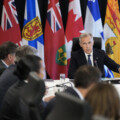In the latest episode of Trump’s Trade War, The Hub’s publisher Rudyard Griffiths speaks with Élie Cantin-Nantel, The Hub’s Ottawa correspondent.
To read Élie’s full analysis, click here.
Key points:
- Economic frustrations drive sentiment: Younger Canadians are increasingly open to joining the U.S. due to economic challenges, including a weaker Canadian dollar, lower purchasing power, and unaffordable housing.
- Cultural similarities blur national identity: Younger generations see fewer cultural distinctions between Canada and the U.S., leading some to question the value of maintaining Canada’s independence.
- Affordability Crisis: One example is the skyrocketing cost of housing in Canada, compared to more affordable options in the U.S., which has left many young Canadians feeling disillusioned and economically trapped.
In this episode of Trump’s Trade War, Elie Cantin-Nantel, Ottawa correspondent for The Hub, shed light on a surprising trend among younger Canadians: a growing openness to the idea of Canada joining the United States as the 51st state. This sentiment, particularly strong among Canadians aged 18 to 34, reflects deep economic frustrations and a sense of disconnection from traditional Canadian patriotism.
Cantin-Nantel highlighted a recent poll that found 43 percent of younger Canadians would support joining the U.S. if offered full citizenship and a conversion of the Canadian dollar to U.S. dollars. “It is quite widespread,” Cantin-Nantel noted, pointing to economic factors as the primary driver of this sentiment. Younger Canadians, he explained, feel the sting of a weaker Canadian dollar and the rising cost of living. “When you go to the U.S., it’s like going to Europe with the euros. The value of that currency is so much bigger, and you feel poor, quite frankly, when you go to the United States,” he said.
He also touched on the cultural similarities between Canada and the U.S., which have blurred the lines of national identity for many young Canadians. Cantin-Nantel argued that younger generations, raised in a globalized world, see fewer distinctions between the two countries. “Young people have grown up in a very globalized world where there’s not that many differences between Canada and the U.S.,” he noted. This lack of cultural differentiation, combined with economic struggles, has led some to question the value of maintaining Canada’s independence.
Cantin-Nantel also pointed to the stark economic disparities between Canada and the U.S., particularly in housing affordability. He shared anecdotes from young people in the U.S. who have purchased homes at a fraction of the cost of Canadian real estate. One of the people Cantin-Nantel interviewed stated “My friends who are dual citizens have been able to purchase homes in the U.S. that I could only dream of in Canada,” highlighting the growing frustration among younger Canadians who feel locked out of the housing market despite their education and hard work.
Generative AI assisted in the production of this story. If you are quoting from or referencing this episode, please refer to the audio to verify.








